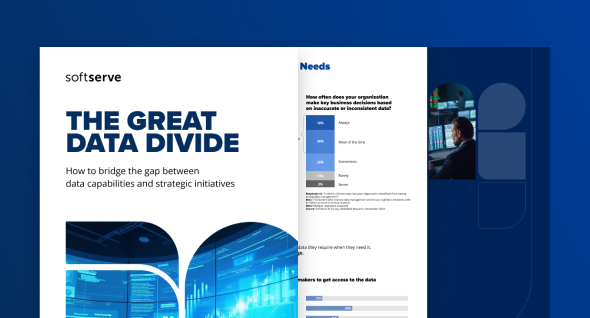
Specialist Digital Teams Can Pave the Way for Data Success
Data has become the new corporate holy grail that firms are not only struggling to find but often cannot even decide where to start looking.
Despite hurdles, the deeper we delved into trying to understand how companies are tackling these data challenges, the more we realised how some straightforward changes can bridge this widening digital divide.
One of the key findings from global research we commissioned Wakefield to undertake was how many of them admitted to a data disconnect between C-level executives and their business unit heads. This implied that management at the top lacked real visibility into the extent of data mismanagement.
The results showed that while 79% of VPs believed no one in their company fully understood the entirety of the data they collected, or how to effectively deploy it, only 45% of C-suite executives shared those concerns. (You can read a full copy of the report here.)
No one at my organization has a full understanding of all the data we collect and how to access it.

For some, this might just reflect a communication challenge. For others, it represents a wider schism where those at the top are blissfully unaware of how fast the proverbial duck has to paddle beneath the surface to stay afloat.
Either way, the results highlight a structural information gap that in many instances is compromising the ability of organizations to successfully transform data into a formidable asset. In one article, we explore the importance of establishing a clear business purpose and defining use cases to achieve desired outcomes with data. In another, we analyse the challenges of data and Gen AI.
Improve Insight
We see how companies can overcome situations where leadership lacks insight into the hurdles and potential benefits of data technology and need more specialist support. There have, of course, already been attempts to improve this situation, not least by the introduction of roles like a Chief Data Officer (CDO) or giving more powers to a CTO.
But these have not always been successful, partly because they have become compartmentalized functions. At the same time, upwards communications have also become challenging as technology-focused employees often struggle to articulate the importance of data for their projects to a business-centric audience. It is not the best mix.

A new approach would try to square that circle, so to speak, by building a team that can have much wider data responsibilities. If companies are going to build their competitiveness in data-driven markets, they should introduce a designated role, committee, or communication structure to bridge this gap. This approach will better evaluate data projects for alignment with top-level leadership priorities and technical feasibility. It will also control budgets and prioritize investment.
This committee — or digital lobby group — should consist of a variety of business functions and expertise and include solution architects, business analysts, and project managers. It will require an independent mandate and budget to assess, fund, and pursue data projects.
This advisory group will ensure that leaders are not left with incomplete or inaccurate data. Instead, they are empowered with facts when making decisions. It will also give confidence to those at the digital coalface that the organization is on the same page when tackling these challenges.

Then, arrange to speak with one of our experts to discover how it can work in your organization.
Check our page here
